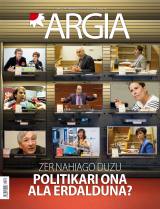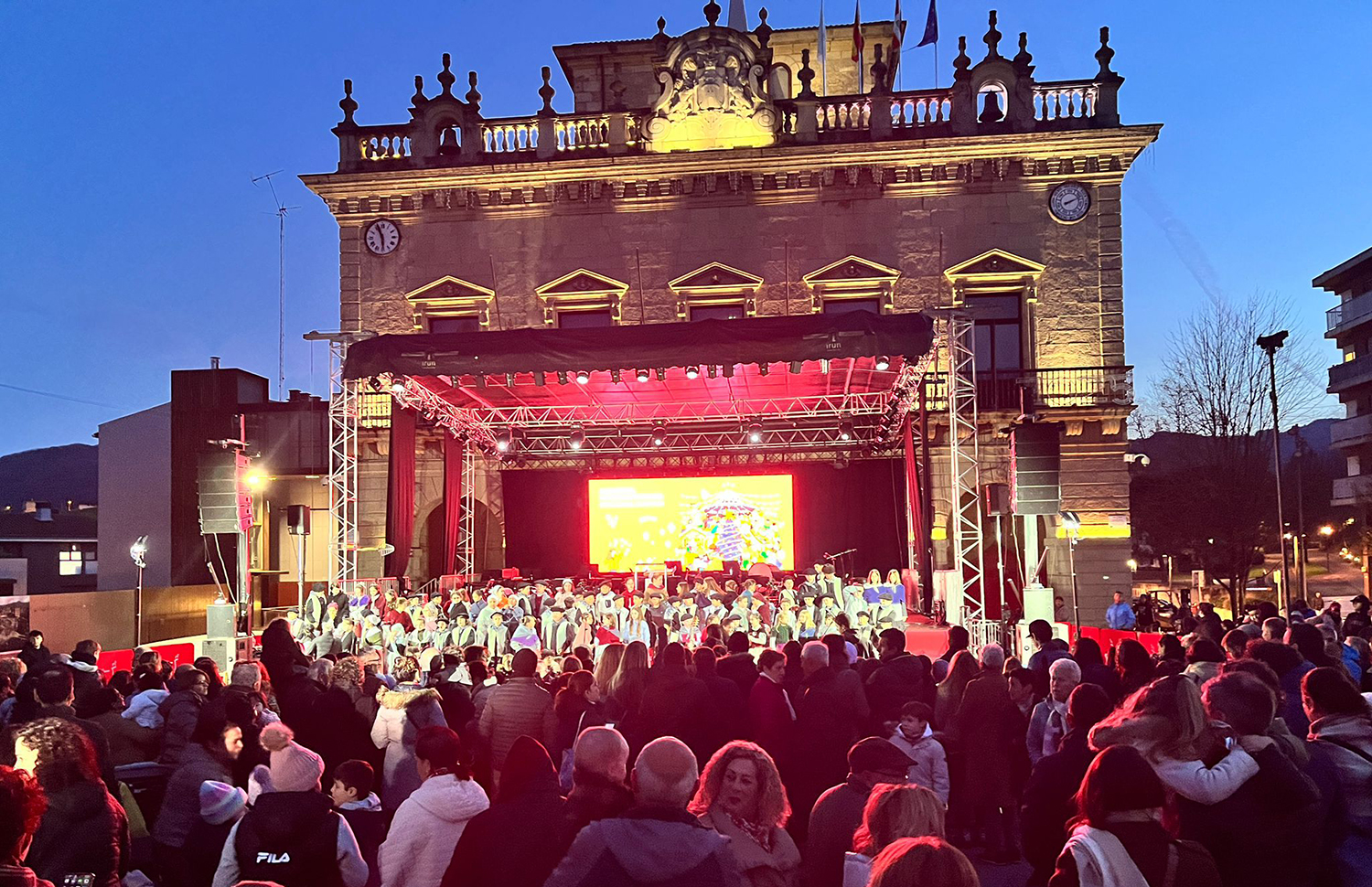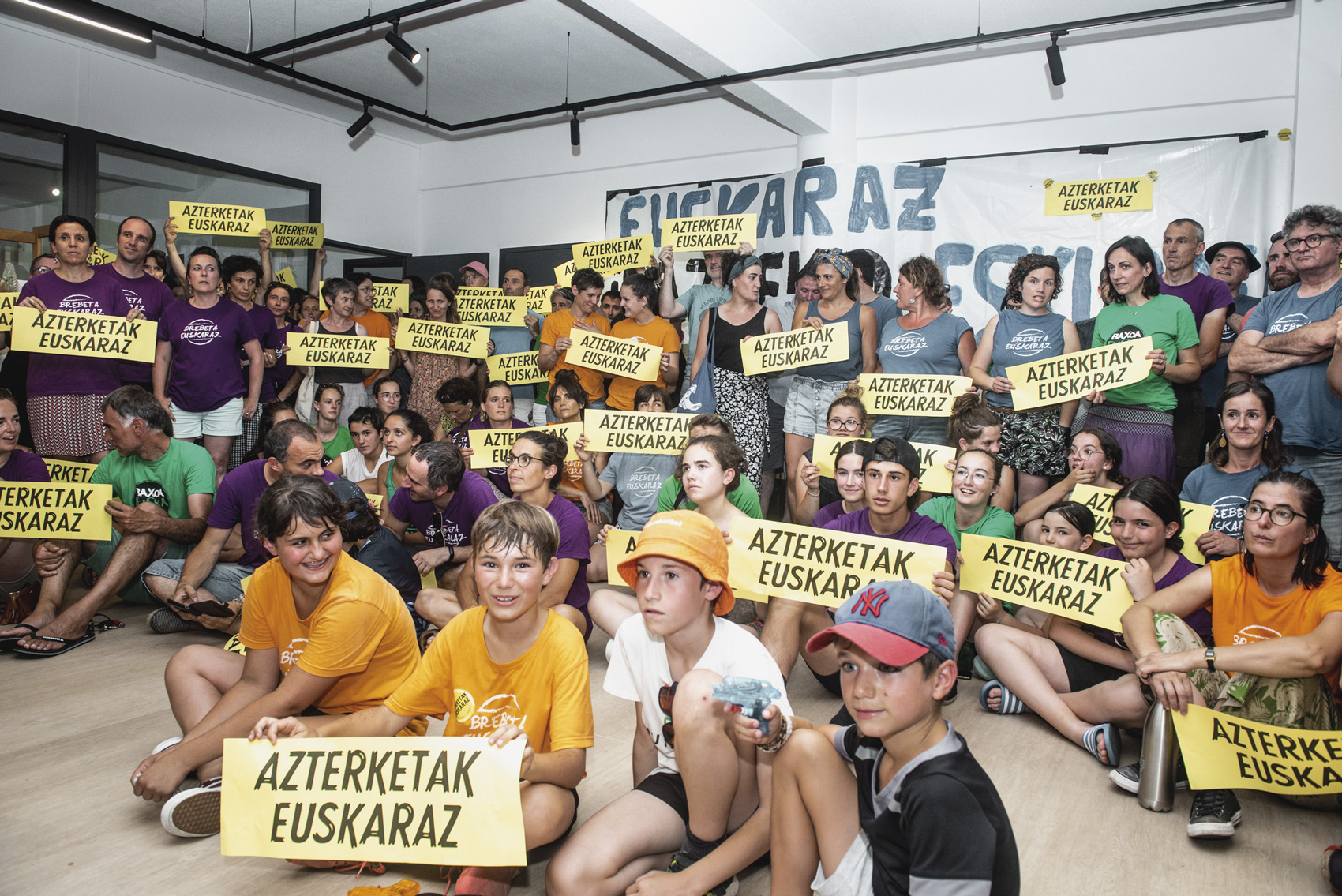For political representatives, the language of citizens is secondary
- Is it essential that the political representatives know Basque? What criteria should candidates entering the electoral lists meet? We have asked the political parties, and the criterion they have repeated most is that of parity, as it is a legally established feature. Euskera... important yes, but essential...

The citizen has asked the Ertzaintza to speak in Basque in the Ertzaintza. The ertzaina replies: “In Spanish, I don’t know Basque. If you want to speak in Basque, talk to Beltrán de Heredia.” Someone told him in a tweet and reminded Paul Bilbao, Secretary-General of the Council, when we asked him for the Council’s opinion on this issue. Estefanía Beltrán de Heredia is a Basque Government security advisor and does not speak in Basque. In a context in which we are taking the issue of political representatives and the Basque Country, for Bilbao it is an excellent answer that the ertzaina answers, which helps to put the issue right: “What will you say to him? On the one hand, you can tell which goat! And on the other hand, he's right! Let's say he had a hard time getting into the Ertzaintza. That in the first one did not enter due to poor score, that in the second one did. Perhaps, he himself complained that he considered the Basque level required in the call for employment to be too high. Of course, it is not an Basque Ertzaina. But you think of something like this. The citizen asks me to do so in Basque, I have to meet the linguistic requirements to access my job and the one who has forced me to have it does not know Basque?” The worker has to know Basque, but the boss, the politician, does not know. Language fluctuations affect citizens and workers, but not adults.
This is not the only and most important argument for the political representatives to know Euskera, but in Bilbao’s view, this great contradiction shows how incomprehensible the situation is: “Members of the Government, whether party, party or independent, are at the service of all citizens. Knowledge of languages is essential in these places.”
Sufficient age 18 years
When we say political representatives, we are talking about councillors, mayors, parliamentarians, members of government. To access the command post, to access the list of candidates, only one requirement must be met: Be 18 years old. In the Spanish state, in addition to individuals, there is another criterion that everyone must meet: parity. In the opinion of Paul Bilbao, the requirement to know the language of the area should be something separate. The authorities' lack of knowledge of the Basque country has consequences.
One of the consequences is the creation of barriers to communication inside the house. They condition meetings, reports, etc. members and advisers, parliamentarians and parliamentarians, councillors and councillors with colleagues who do not know Euskera. In political activity, Euskaldunes have no choice but to change their language without resorting to expensive translation and interpreting services. It also affects citizenship. It can be an example of the municipal plenary. In what language will citizens participate if any councilor or mayor does not know Euskera? Yes, there are resources to send the message to the citizen in their language, for example using the translation service. But they're not always available and they're not cheap. It may be more cost-effective to take preventive measures, that is to say that political representatives are learning Basque.
And the excellent and cheap translation system is not the solution. Who will honor the language? This is what Bilbao says: “Being lehendakari euskaldun does not mean that there will be more Euskaldunes citizens, no. But lehendakari, the counselor, also has an influence on the functioning of the Basque country. This shows that the language is located in the decision-making centres”. Remember the ertzaina passage.
Progressivity
Bilbao does not like this term much, because it believes that if we are more and more Euskaldunes (and the data indicate it) there is less excuse for language profiles to be stronger than the current ones. It is, however, in favour of taking account of socio-linguistic characteristics when demanding political representatives from the Basque Country. In any case, he has highlighted two characteristics above all the others. On the one hand, in some municipalities (usually small) the secretary or financial controller has more power than the mayor himself, and his knowledge of the language can influence the actions of politicians. Therefore, in these municipalities, care must be taken to ensure that the secretaries or auditors know the Basque country. On the other hand, Bilbao considers that it is not the same to apply the progressivity in a municipality of 100 inhabitants in which 10% of the population is Euskaldun that in a municipality of 10,000 inhabitants has the same percentage. In the second, the Basques are much more.
Faced with legislation, politicians or those who want to enter politics can sleep peacefully, the constitutions of Spain and France say that it is mandatory to know Spanish and French (respectively), and not to know Basque. Another thing is to talk about the importance of Euskera when you or a party colleague do not know. At the same time, Euskera is a co-official in the CAV and part of Navarre, so citizenship has the right to express itself in Basque. The clash of rights will be overcome by putting means, but not by demanding a language that interferes in the Basque relationship.
Asking political parties about linguistic criteria
Garbiñe Zurutuza, Bildu: “If the candidates do not know Euskera, we ask them to commit to study in the legislature”
For us it is very important that the political representatives, mayors, councillors, parliamentarians... know Basque. Being our working language Euskera, at the time of making the lists, we tried to select the people who know Euskera, and if they don't know, we asked them to commit to studying during the legislature. Our goal is to have bilingual representatives.
For example, when the parliamentarians of Vitoria Oscar Matute and Diana Urrea took office, they did not know Euskera, but now, after three years, they have striven to learn Euskera, have learned and have a better and better level. On the other hand, our parliamentary group in Vitoria-Gasteiz has the Bai Euskarari certificate, and it is noteworthy that it is the only group with this certificate.
Maria Solana, Geroa Bai: “Those who are to be the top of the list must necessarily know Basque”
One of our criteria is to bring together people from different regions of Navarra so that not all of them belong to the Region of Pamplona. Parity is imposed on us by ley.Por the rest, the aspirants to head the list have the duty to know, necessarily, the Basque for any type of choice. Whether it be the Congress of Spain, whether it be the Parliament of Navarra, or to be a candidate for lehendakari. We do not ask that all the candidates be Euskaldunes, and we do not think it is good that this issue should be taken as an obligation. Otherwise, we find it hard to complete lists. The other thing is that not only should the candidates be Euskaldunes, but that they should be tried to make them as capable as possible. We do so more on principle than by force. For example, AEK gives Euskera classes in Parliament to all parliamentarians and workers who so wish. In our lists they are not all Basque, but they are Basque.
How can the head of the Basque list be requested in Ribaforada (non-Basque area) when working at the municipal level? We ask, above all, in the Basque and mixed area that they be Euskaldunes, and in them also according to the people.
Santos Cerdán, PSN: “To be a politician in Navarre you don’t have to speak Basque”
We support the last amendment to the Basque Law, but that does not mean that the fact that Basque is being spoken as a candidate in the socialist party is an essential condition. 88% of the population of Navarre do not even know. I respect the Basque, but not an essential condition.
Other criteria yes
A few legislatures ago, we started to put the condition of parity. In the municipalities of over 10,000 we make steps, alternating women and men. On the other hand, we take into account the training and willingness to give everything at work.
From the preceptivity
In Navarre we have two languages and in some places the Basque is co-official. Fortunately, we have a common language, Spanish is that language. Languages should not help to create ghettos. To be a politician in Navarre you don't have to speak Basque, you have to feel like working.
Gorka Maneiro, UPyD: “We defend freedom, everyone uses what they know”
We don’t have linguistic criteria. Speaking in Basque, knowing, it's OK, but we don't make any differences. The important thing for us is to be willing to defend the ideas of UPyD. We demand one thing: to have worked for at least four years anywhere, administration, company...
I think it is good that people can use both languages, I can speak with you to speak with the media, but at the moment in the CAV there are many people who do not know Euskera.
Only EH Bildu defends compulsoriness. We defend freedom, let everyone use what they know. We must not forget that we all know Spanish and not Basque. If you know Basque well.
Basque and parliamentary citizen in Spanish?
I respect that some citizens do not like it. Some people want everyone to do it in Basque, but at the moment you can't. The citizens will decide with their vote who politicians or candidates are to be elected.
Rafaela Romero, PSE: “In the party there is a will to master both languages”
The situation is different in Bizkaia, Gipuzkoa and Álava. In Bizkaia and in Álava we have had trouble making lists and it is true that in some places there are not those who control two languages, but there is increasing numbers, especially in the villages where the party is strong. All the candidates dominate the Basque country in Gipuzkoa, in the General Boards and in the Provincial Council of Gipuzkoa. There may be problems speaking, but not understanding. The knowledge of the Basque country is not obligatory to be a candidate, but it is increasingly important, it is internalized in the party, there is a will to master both languages, and there are many people who are learning. The need for Euskera is not written, but it is very important. Over the past ten years, change has been fundamental. The candidate must be bilingual.
Should it be forced?
It is not positive, it is not necessary. I know you have to speak Basque and Spanish. I think the best way to build this country is to speak the two languages, if not, you lose half a village. You've been in politics for so long, you don't need to be forced, you realize.
Joseba Ezeolaza, Left-Ezkerra: “Obligation is a bad idea to promote Euskera, we have to be more pedagogical”
The knowledge of the Basque Country is a very important, positive characteristic, but it does not have to be a limitation. It's better to know than not to know. Our two parliamentarians are Castellanoparlantes, but the only councillor of the City of Pamplona is Euskaldun, the head of the list of Villava was like this, that of Baztan... of many peoples.
We are against political representatives needing to know Euskera. We only have one condition for completing the list: parity. Compulsion is a bad idea for promoting Euskera, we have to be more pedagogical. We have to reward the knowledge of Euskera.
Aitor Olaizola, PNV: “List heads are asked to know the Basque Country”
For EAJ-PNV, the Basque Country is our most outstanding sign of identity, the sign of identity of the Basque society.
It is a few years since EAJ-PNV approved the Basque plan for its activity. This Euskera plan includes the advice, criteria and obligations that must be taken into account internally (internal party positions, public offices and affiliates), as well as the linguistic criteria that must be taken into account in social activities, such as electoral lists. According to these criteria, for example, the heads of the EAJ-PNV list for the Basque Parliament, the Foral Parliament of Navarra, the Congress and the Senate, and the European Parliament are required to know the Basque.
The PNV will place Language Policy at the centre of its governance activity in the institutions it governs.
Oak Camblong, collecting Hendaya: “In Council three we take the floor in Basque”
In the House of the People of Hendaye we have been 33 elected, the Basques I would like to say about 8-10. The mayor of the town, Kotte Ezenarro, is Euskaldun berri. In the Council we do not take the floor 33 people, but of those who participate three we do so in Basque. Iker Elizalde was the first to speak in Basque on the council. Since there is no translation, we do so in French. The other two are Mixel Muñoz and I.
Why don't those who know how to do it in Basque? Some aren't very skilled, and maybe that's why they don't dare, they're convinced they're going to give a bad image, although some do better than they expect.
Another reason may be politics (it is always my impression), the fear of losing some of the voters. On the other hand, the Basque language is not established at the level of other languages. And in general, I would say that Euskera is not one of the priorities, and I think that is the case in all respects.
























